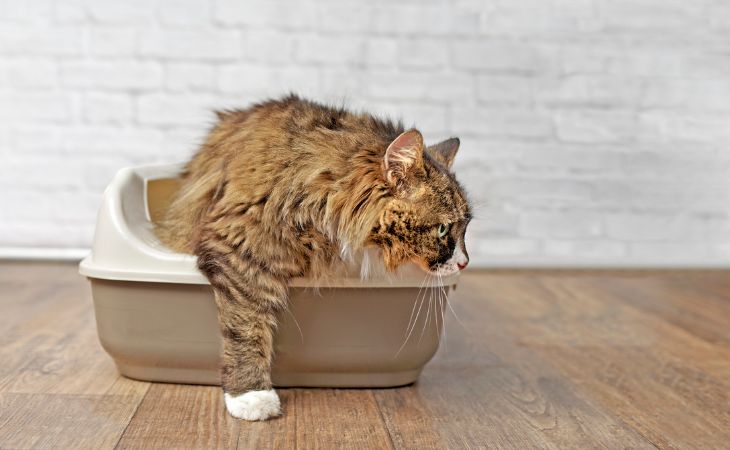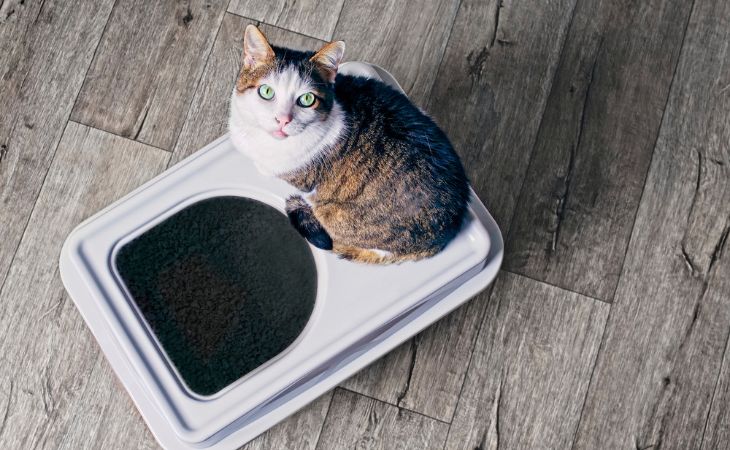Diarrhea is a digestive issue which manifests itself through soft, liquid, or abnormally abundant stool. There are many reasons why a cat can have diarrhea, ranging from simple indigestion to serious illnesses. To find the most efficient treatment for your cat, you need to identify what the cause is. In this article, Letsgetpet will provide advice to help you identify the cause of your cat’s diarrhea and better manage it.
Possible causes of diarrhea in cats
The first step to relieving your cat’s discomfort when they have diarrhea is to identify what is causing it. There are many potential causes for diarrhea, whether it be acute or chronic. Acute diarrhea occurs when it lasts for less than two weeks, and chronic diarrhea refers to when it lasts longer that that. To begin with, dietary causes are the most common. Your cat may experience diarrhea following a sudden change in diet. This can cause irritation to the stomach and intestines, leading to diarrhea.
Cats can also be sensitive or allergic to certain ingredients, such as lactose or certain proteins. Ingesting food that contains these can cause diarrhea. Bacterial or viral infections of the stomach and intestines, such as gastroenteritis, can also cause it. In addition, parasites such as intestinal worms (roundworms, tapeworms) can also be possible causes of diarrhea.
In addition to this, your cat can experience diarrhea after ingesting foods that are toxic for cats such as chocolate, poisonous plants, or certain medications. Certain chronic inflammatory bowel diseases can also cause it. In addition, stress can also cause diarrhea in your cat. Your cat may be stressed by a change in their environment, strangers, or other factors.
This article might interest you: Top 26 dangerous foods for cats
Signs that should alert you
Diarrhea can lead to dehydration, weight loss, or a change in your cat’s general state and well-being. You need to consult your vet if you observe any of the following signs. The most observed is the change in consistency of your cat’s stool. The stool can become very liquid, watery, soft, bloody or contain mucus. Your cat’s stool frequency may also increase. In addition, your cat may need to go to the litter box more often than usual.
There may also be an increase in stool volume. Diarrheal stools may also have an unpleasant odor, which is stronger than usual. Another sign that your cat may have diarrhea is an urgency or inability to hold in their stool. Due to increased intestinal motility, your cat may have difficulty, which can lead to accidents in the home. Diarrhea can also be associated with loss of appetite in some cats.
If your feline refuses to eat for a prolonged period, you should take them to the vet as soon as possible. In some cases, diarrhea can be accompanied by vomiting. Affected cats may also appear tired, lethargic or less active than usual. Other signs such as bad breath, a dull coat, excessive thirst, abdominal pain or bloating should also alert you.

What examinations should be carried out at the vet’s when your cat has diarrhea?
If you notice that your cat has diarrhea, you should bring them to the vet immediately. This is because they will be able to conduct complete clinical examinations of your pet. They can also ask you questions about their medical history, their diet and their way of living. In addition, they can also ask for complementary examinations to confirm the diagnostics and identify the cause of the diarrhea.
The vet can perform a blood test to evaluate if your cat’s liver and kidney is functioning well and evaluate your cat’s general blood profile. This can help identify abnormalities or infections. In some cases, a stool culture may be performed to identify specific pathogenic bacteria present in the stool that could be responsible for the intestinal infection. If food intolerance is suspected, food allergy testing may be recommended to identify foods to which the cat may react negatively.
The vet may also perform an abdominal ultrasound to assess the structure and condition of the internal organs, including the intestines, in order to detect any abnormalities or inflammation. For cases of chronic diarrhea or suspected inflammatory bowel disease (IBD), an intestinal biopsy may be necessary. This provides a tissue sample for further analysis.
This article might interest your: Cats and their fear of the vet
Treatments to relieve your cat’s diarrhea
The treatments for diarrhea depend on the cause and its gravity. The vet can recommend different remedies. For example, it can be medical or natural treatments.
Medical treatments
There are many medical treatments to relieve your cat’s diarrhea. However, the choice of one or more of them should be made after identifying the cause of the ailment and the symptoms. This may involve oral or intravenous rehydration if your cat is dehydrated.
Fasting for 12 to 24 hours may be necessary to rest your pet’s digestive tract. A specific diet, low in fat and fiber, easy to digest and rich in water, may be recommended by your veterinarian. Your veterinarian may also prescribe probiotics to restore the intestinal flora and anti-diarrhea drugs to slow transit and protect the intestinal mucosa.
It may be necessary to give your cat anti-inflammatory medications to reduce inflammation of the intestines. Antibiotics or antiparasitics may be used if your cat’s diarrhea is infectious. Your vet may also prescribe antiemetics if your cat is vomiting, or painkillers if he’s in pain.
This article might interest you: How to give your cat medicine
Natural treatments
Natural remedies can help relieve your cat’s diarrhea:
- activated charcoal, which absorbs toxins and gases,
- green clay, which heals intestinal lesions,
- psyllium blond, which regulates transit and forms a protective gel,
- plain yogurt, which contains beneficial bacteria,
- chamomile or fennel to calm spasms and nausea.
These remedies should be given with caution and the doseage indicated by the vet should be followed. They should not replace appropriate medical treatment.
The right diet for a cat with diarrhea
The food that your pet eats plays an essential role in the prevention and treatment of your cat’s diarrhea. Be sure to change your cat’s diet gradually if necessary, introducing the new food over a period of 7 to 10 days. Avoid feeding your cat foods that you eat, especially those that are fatty, spicy, sweet or milky.
You need to prioritize high quality food, adapted to the needs of your cat according to their age, breed, and state of health. Split the ration into several small meals a day, to help facilitate digestion. Respect the quantities recommended by the vet or packaging to avoid risks of obesity and undernutrition. Leave fresh, clean water available for your cat at all times, to prevent dehydration.
This article might interest you: Understanding the nutritional needs of cats
How do I prevent my cat from getting diarrhea again?
To prevent your cat’s diarrhea from reappearing, you need to follow the tips provided by your vet and respect the duration of the treatment. You also need to regularly control your cat’s weight and the general state of health. You should also deworm your cat every 3 to 6 months, depending on their lifestyle.
In addition, vaccinate your cat against infectious diseases, depending on the protocol established by your vet. Limit their access to areas where they might find things like trash, toxic plants, household cleaning products, waste, and sick animals. Reduce your cat’s stress by offering them a calm, safe, and enriching environment.

